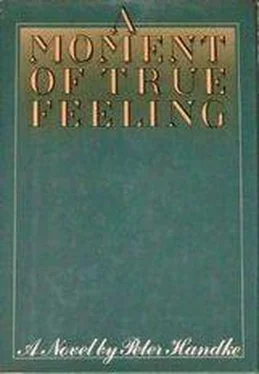Lovelessly but anxiously he made love to her. She didn’t dissemble, she looked at him so unforbearingly that he wasn’t even able to close his eyes. In the next room the children had been laughing loudly for some time, for no reason. He tried in vain to think of another woman; there wasn’t any. Beatrice hadn’t been joining in his movements for some time and they had become all the more violent. He was hopelessly trapped, she had seen through him. His scrotum grew colder and colder. His tongue rattled in his wide-open mouth. He stroked the withered skin of her elbow and wanted to howl with hopelessness. A pile of newspapers under his arm began to slide … Beatrice rested her hand on his shoulder and slipped out from under him. Sitting up, she combed and fluffed her hair. He lay there forlorn, and she covered him up before leaving the room. A window swung open, the city roared; the world seemed to have reduced itself to a few terrifying sounds and otherwise to be empty. Outside something terrible had happened, and he was the victim. Why couldn’t he hear the children any more? Children’s voices would have brought him some relief.
He found Beatrice in the kitchen, where she was shelling peas into a bowl. She was singing — and once, when she got stuck in her song, she stopped shelling until she finally remembered the words. She knew all about him — and he no longer knew anything about her. “I feel so full of longing today,” she said, and paced the floor in front of him. She spoke as carefully to him as if she had been on the phone. “This morning I saw a rainbow and I was ready for almost anything. I need to experience something!” Yes, she was right: with him she had “experienced everything”—but nothing that mattered any more. — He took Agnes and left the singing Beatrice; he slunk away. The elevator was still at the same floor: so few people were there in the summer. Down below, the stone floor of the doorway had just been hosed down, and suddenly Keuschnig smelled the dark church of his native village. In the same street there was a restaurant mentioned in the guides, but it was closed — FERMETURE ANNUELLE; the windows were whitened on the inside and he couldn’t even look in.
Only a plan can help me now, he thought. Whatever I do from now on must be figured out in advance, as if it were business. UNE NOUVELLE FORMULE — that was a slogan used to advertise a restaurant that had only one menu to offer, with no choice. Before a business went bankrupt, you thought up a new formula. Why shouldn’t he do the same for himself? Reinvent himself! — First he would patiently observe other people; that seemed necessary if he was to recompose himself.
He took the child to a restaurant on the Place Clichy for lunch; there were cloth napkins, and today he found it soothing to unfold them. (A good many restaurants used paper napkins during the summer months when they were patronized chiefly by tourists.) He stretched out his legs and looked expectantly at the people around him. The immediate future seemed taken care of. Agnes was noisily guzzling her soup. When he poured water into her glass, he felt his heart going out to her with the stream. There she sat, alone and self-sufficient. She needed him only insofar as he enabled her to attend to herself without being afraid. With the taste of wine in his mouth, Keuschnig longed to find the beautiful strange land where death would no longer be a bodily presence. At last the day is rising, he thought, and felt that his eyes were opening of their own accord, with no effort on his part.
At the next table there was a couple, who talked from the moment they sat down to the moment they got up, without the slightest pause. They’ve found the formula, he thought. At first he admired them; then he had the impression that their faces had been lifted. Every time the husband finished saying something, the wife, as though to reward him, said: “Oh, I love you!” Both had bad colds and it gave them great pleasure to talk in their deep rheumy voices. Once the wife kissed the husband on the cheek and he went right on picking his nose. At another table they were taking a child’s picture, but waiting to snap it until a genuinely childlike smile appeared on its face. They spoke in sentences with the last word missing, and the child had to supply it, so everything they said to the child took the form of a question. “We put our napkin on our …?” “Lap,” said the child. — “The Seine flows into the …?” “Sea,” said the child. — “Bravo! Bravo!” Two men eating alone had the following conversation: “I’ve been having a run of luck with the ladies,” said one. “I’ve got something nice; had her for three weeks now,” said the other. The patron was standing beside another table, telling a joke. After he had left them the people at the table spoke very softly. A fat man had a table to himself; all the waiters stopped to shake hands with him. Before making out a check, he stretched his arm and his coat sleeve slid far up his wrist. As he signed, his tongue protruded from his mouth, and then he looked around, apparently wondering where else he could sign. Another couple were talking about poetry. The husband would make a long pause in midsentence, as though reflecting; then he would say just what anyone would have expected him to say. When someone at the next table asked him for the salt, he started as though interrupted in a reverie. “I’ve always been a romantic,” he said to his wife. Another man spent a whole hour reading a single page of France Soir —the daily installment of the serialized novel; the page he had folded back carried the results of a public-opinion poll, according to which more Frenchmen were satisfied with their lives than according to last month’s poll. The woman at the cashier’s desk was bent over a sheet of paper with a concentration known only to persons checking accounts. In the kitchen a waiter in black was bending the ear of a waiter in white. A handsome man came sauntering in with his lips slightly parted, as though he knew every language in the world; one eyebrow upraised, nostrils perfectly plucked, he was biting his lower lip. He was followed by a not quite so handsome woman, who kept her face rigid for fear of spoiling her not so very great beauty. How shamelessly they displayed themselves — as though everything had already been said about them and they had nothing more to fear. All their worries are behind them, thought Keuschnig. As he looked at those two who were after all so much like him, Keuschnig couldn’t conceive of wanting to be anything but dead.
The food went dry in his mouth. He pushed his plate away and looked at Agnes, who was dipping bread in her sauce. Bent over the table, wholly taken up with eating, she smiled. The most commonplace things make her smile, he thought. At that moment he felt no nostalgia for that condition, but took pleasure in the thought that she might never know such disgust, such hate, such horror as his.
How could he have supposed that he would feel safe in a restaurant? There was no longer any place where he could be outside the world; in his situation nothing could be relied on. The longer he looked at people, the more unimaginative he became. They — and he too — were all characters in a film, the story of which was obvious after the very first frame. (Hadn’t the waiter known in advance what he was planning to order? So naturally he had ordered something else.) Maybe he had been observing them in the wrong way, in the wrong place, with the wrong attitude — in any event, regardless of how he put his perceptions together, they arranged themselves, independently of him, into the traditional well-bred nonsense. The imposture of napkins on laps! The perfume of the women brought up memories he didn’t want, and the pommes frites, which until very recently he had thought of as “good old pommes frites ,” only gave him a headache. Long long ago Keuschnig had imagined people he disliked asleep, so as to like them better; now they continued to revolt him even when he thought of them with their knees drawn up in eternal sleep. And the “charming sights,” which had once meant so much to him, or so he thought — the sight, for instance, of the child wearing a dress that was too big for her, accompanied by the strange conviction, the CERTAINTY, that she would GROW INTO it — were of shorter and shorter duration; worst of all, they had lost their afterglow. It was easy for that woman outside, passing the open door, to smile at him; they were safe from one another. The woman inside, on the other hand, sitting alone at a table, had taken one look at him and instantly compressed her parted lips, repelled by the chaos in his face. She hadn’t even wanted to change her place, for fear he might misinterpret the least move as a kind of complicity, if not as sexual provocation. Yet, before catching sight of him, she had been sitting there red-nosed, quietly weeping. — You’re boring, he wanted to say to her, as boring as the world. I need a daydream, he thought, or I’ll start howling like an animal; but to set my mind free, I’d have to be able to stop looking at those people. He did indeed look away, but only as a reflex — when somebody dropped a knife … How steadfastly they go through with it! he thought: and then they go out into the street so nonchalantly, with their palms turned outward. The one link between us is that more and more dandruff falls on our coat collars as we eat. It was still early afternoon, and already everything seemed hopeless again.
Читать дальше












